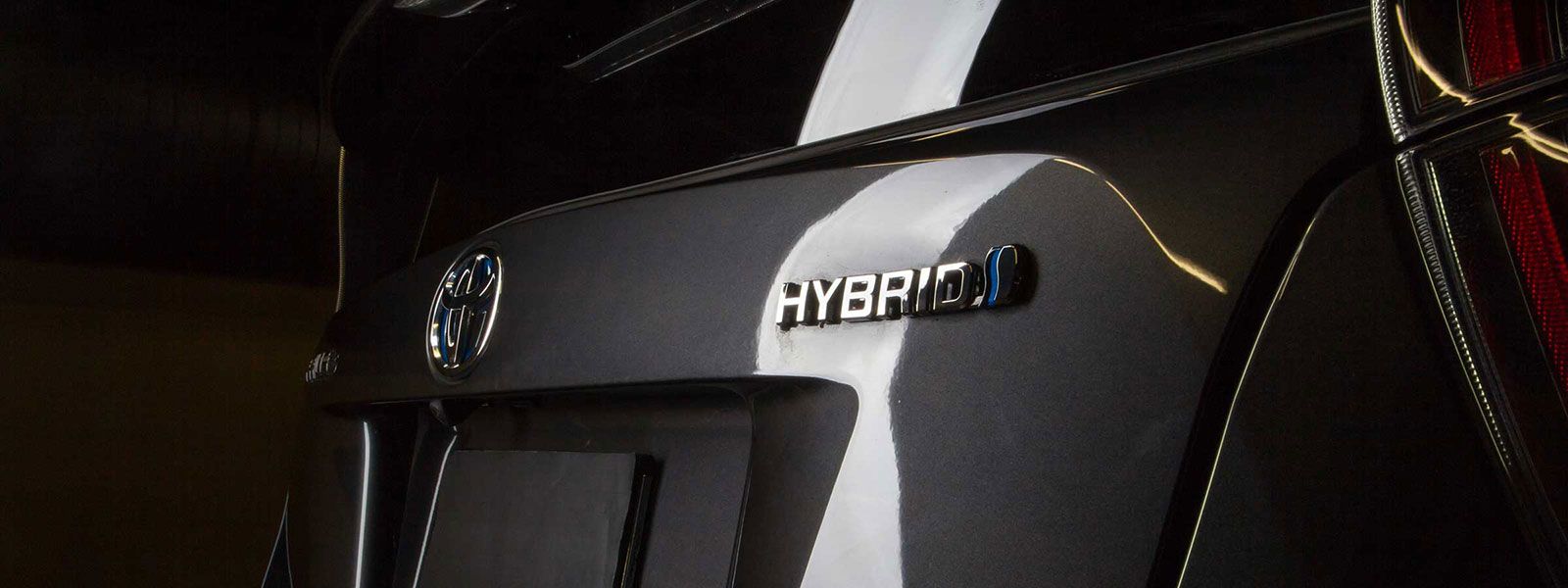Hybrid, Plug-In Hybrid, Electric Vehicle: Understanding the Distinctions
Posted Thursday, Jun 08, 2023
Hybrid, Plug-In Hybrid, Electric Vehicles: What's the Difference?

Exploring How They Work and Weighing the Pros and Cons
A hybrid car combines a gas-powered engine with an electric motor, offering improved fuel economy and reduced emissions. Plug-in hybrid electric vehicles (PHEVs) go a step further, featuring larger batteries that allow for extended electric-only driving. They can be charged via an outlet and offer a seamless transition to gas power when needed. Battery electric vehicles (BEVs) solely rely on electricity, producing zero tailpipe emissions. With modern EVs providing ranges exceeding 250 miles, improved air quality, potential cost savings, and enjoyable driving experiences, the world of electric vehicles offer compelling alternatives to traditional gasoline-powered cars.
At Car Cloud Auto Group, we aim to simplify your car research process by partnering with car-review experts, who provide valuable insights into what matters most when buying a car or truck.
In recent years, electric vehicles (EVs) have witnessed a significant surge in popularity. However, the realm of electrically powered cars encompasses more than just battery electric vehicles (BEVs) such as the Tesla Model 3 or Hyundai Ioniq 5. It also includes hybrids like the Toyota Prius, plug-in hybrids (PHEVs) like the Kia Niro, and hydrogen-powered vehicles like the Toyota Mirai. Let's delve into each type of vehicle to gain a better understanding of their commonalities and differences.
What is a Hybrid Car?
A hybrid car is equipped with both a gas-powered engine and an electric motor that is driven by batteries. Unlike relying solely on the gas engine, hybrids can operate using electric motors alone at low speeds for short durations or in tandem with the gas engine to generate additional power. When braking, the electric motors also function as generators, slowing down the car and converting the energy into electricity stored in the battery. Some hybrids employ the gasoline engine to recharge the battery. Examples of hybrids include the Lexus ES 300h and Kia Sportage Hybrid. 
What is a Plug-In Hybrid Car?
A plug-in hybrid electric vehicle, or PHEV, combines a gas-powered engine, an electric motor, and a larger battery pack. The distinguishing feature of a PHEV is its sizable battery, which allows the vehicle to operate in all-electric mode for a certain distance as long as the battery has sufficient charge. Certain PHEVs, like the Toyota RAV4 Prime, can travel over 40 miles on a single charge. In cases where the battery is depleted, PHEVs function as regular hybrids.
What is a Hydrogen Fuel Cell Vehicle?
Hydrogen fuel cell vehicles, unlike gasoline-powered or plug-in electric cars, don't require gasoline or plugging into a charger. Instead, they rely on hydrogen as their energy source. These vehicles can be refueled with hydrogen at a pace similar to filling up a gasoline-powered car. The fuel cell within the vehicle extracts electrons from the hydrogen to power the electric motor. However, it's important to note that hydrogen fuel cell cars, such as the Toyota Mirai, Hyundai Nexo, and Honda Clarity, are currently only available for purchase in California.
What is an Electric Vehicle?
An electric vehicle, also known as a battery electric vehicle (BEV) or EV, operates solely on electricity without the use of gasoline. It relies on a battery and an electric motor to generate power. Early mainstream EVs like the Nissan Leaf had a maximum range of less than 100 miles, but modern electric cars and SUVs can now exceed 250 miles of range. Some models, such as the Mercedes-Benz EQS and BMW iX, offer ranges surpassing 350 miles, while the Lucid Air can even be configured to provide over 500 miles of EPA-estimated range.
Distinguishing Between a Hybrid and a Plug-In Hybrid
The primary distinction between a hybrid and a plug-in hybrid lies in the charging aspect. By regularly charging a PHEV, you can maximize its efficiency. Both types of vehicles can be driven using gasoline alone. However, if you frequently charge your PHEV, you can significantly reduce fuel costs by driving in
EV mode. This cost-saving benefit is crucial to consider because most plug-in hybrids are priced higher than their equivalent hybrid counterparts.
Pros and Cons of Hybrids and Plug-In Hybrids
Pros:
- Great fuel economy and convenience: Hybrids and plug-in hybrids offer excellent gas mileage without requiring a major lifestyle change, as they still rely on gasoline. Hybrids like the Toyota Prius can achieve up to 57 miles per gallon, while plug-in hybrids like the Kia Niro Plug-in can exceed 50 mpg and cover more than 30 miles in all-electric mode.
- The sufficient electric-only range for average commutes: Newer plug-in hybrids offer enough electric range to cover the average commute of around 20 miles one-way. If charging options are available at work or for short commutes, it's possible to complete most regular driving without relying on the gas engine.
- No range anxiety: Whether driving a hybrid or a plug-in hybrid, there's no need to worry about running out of battery charge. Although these vehicles still require gasoline, they offer peace of mind by eliminating the range anxiety associated with fully electric vehicles.
Cons:
- Internal combustion engine: While hybrids and plug-in hybrids are more environmentally friendly than traditional gas-powered vehicles, they still rely on an internal combustion engine that burns gasoline. This compromises their potential impact on reducing emissions and making a significant environmental difference.
- Maintenance for internal combustion engines: Hybrid and plug-in hybrid owners must adhere to regular maintenance routines associated with traditional gasoline engines. This includes oil changes, timing and accessory belt replacements, and other maintenance tasks in addition to electric component upkeep.
Pros and Cons of Hydrogen Fuel Cell Vehicles
Pros:
- Benefits of EVs without range anxiety: Modern hydrogen fuel cell vehicles, like the Toyota Mirai and Hyundai Nexo, offer a range exceeding 400 miles while providing a smooth electric driving experience. These vehicles require a similar refueling time to gasoline-powered cars, eliminating the need for extended charging periods.
Cons:
- Limited hydrogen fueling stations: Owning a hydrogen fuel cell vehicle can be restrictive due to the scarcity of fueling stations. In many areas, there are limited options, and accessing existing stations can involve long waiting times. Presently, hydrogen fuel cell vehicles are only sold in California, limiting their viability for long-distance travel.
Distinguishing Between a Plug-In Hybrid and a Battery Electric Vehicle
Simply put, a battery electric vehicle operates exclusively on electricity and does not rely on gasoline at all. These vehicles lack a gasoline tank, meaning there's no provision for liquid fuel like in a plug-in hybrid. While plug-in hybrids can be driven in electric mode, they can also operate using gasoline, similar to conventional hybrids.
Distinguishing Between a Hydrogen Fuel Cell Vehicle and a Battery Electric Vehicle
Both hydrogen fuel cell vehicles and battery-electric vehicles use electric motors for propulsion. However, they differ in terms of energy storage methods. Fuel cell vehicles generate electricity using hydrogen, while battery electric vehicles store electricity in a large battery for powering the electric motor.
Pros and Cons of Battery Electric Vehicles
Pros:
- Environmental friendliness: Electric vehicles have zero tailpipe emissions, making them highly eco-friendly. Models like the Ford Mustang Mach-E or Tesla Model Y contribute to reducing carbon footprints and improving air quality.
- Improved air quality: Shifting to electric cars can have a positive impact on air quality, particularly in regions like Los Angeles, where increased electric vehicle adoption has been linked to a decrease in asthma cases.
- Potential cost savings: Charging an electric vehicle at home can be more cost-effective than refueling with gasoline. While charging costs vary, switching to an electric vehicle often translates to savings on fuel expenses.
- Reduced maintenance requirements: Electric cars generally have lower maintenance needs compared to gasoline-powered vehicles. With fewer moving parts and no oil changes or belt replacements required, electric vehicles offer simplified maintenance routines. Additionally, regenerative braking systems can extend the lifespan of brake pads.
- Enjoyable driving experience: Electric vehicles provide instant torque, resulting in a thrilling and responsive driving experience. Even non-sports cars, like the Tesla Model S, offer impressive acceleration, with some models reaching 0 to 60 miles per hour in just over 2 seconds.
- Electric vehicle tax credits: Many electric vehicles, including used ones, are eligible for tax credits. These credits can potentially provide significant savings, with a maximum credit of $7,500 for new vehicles and $4,000 for used vehicles, depending on specific criteria.
- HOV lane accessibility: In certain states, owning an electric vehicle grants access to high-occupancy vehicles (HOV) or carpool lanes. This perk can be particularly advantageous in high-traffic areas. Some states even extend eligibility to used electric vehicles based on their registration history, although specific requirements vary.
- Peaceful driving experience: The silence of electric vehicles can be a unique and calming aspect of driving. The absence of engine noise provides a quiet and serene atmosphere, especially after a long day of work.
Cons:
- Range anxiety: While the range of electric vehicles has improved, it remains a concern for some. Most electric vehicles can now cover over 200 miles on a full charge, which is suitable for regular driving. However, longer trips or situations where charging infrastructure is limited may trigger range anxiety.
- Limited charging infrastructure: Reliance on public charging stations can be disappointing due to the current state of charging infrastructure in the United States. Insufficient availability, out-of-service stations, and high charging costs pose challenges. Although efforts are underway to improve the charging network, progress may take time.
- Limited availability of affordable options: The electric vehicle market has predominantly focused on luxury SUVs, making it challenging to find affordable alternatives. While options like the Nissan Leaf and Chevrolet Bolt EUV exist, the lower-end of the price spectrum offers limited inventory and potentially compromised range and features.
- Long charging time: Charging an electric vehicle takes longer than refueling a gasoline vehicle. Even with home charging, it cannot replicate the convenience and speed of traditional gas station visits. While fast-charging options exist, relying on them frequently can accelerate battery degradation.
- Battery degradation: Similar to other rechargeable batteries, the battery in an electric vehicle will degrade over time. Frequent charging can contribute to this degradation. Although techniques like relying on Level 2 charging can extend battery life, eventual replacement may be necessary, which can be costly if it occurs after the warranty period.
- Indirect reliance on fossil fuels: While electric vehicles produce no tailpipe emissions, the electricity used to charge them often comes from power plants reliant on fossil fuels. This also applies to hydrogen production, which is primarily derived from the same refineries producing gasoline. However, if the electric grid relies on renewable energy sources or if solar panels charge the vehicle at home, the environmental benefits increase.
Conclusion
The world of electrically powered vehicles offers a range of options for your daily commute. Hybrid vehicles can significantly improve fuel economy, while electric vehicles offer potential cost savings and environmental advantages. Ultimately, your personal financial situation and specific needs will dictate the best choice for you, but rest assured that there are numerous options available to suit your preferences.

FAQ
- Q: What is the difference between a hybrid and a plug-in hybrid?
- A: The main difference is that plug-in hybrids have larger batteries and can be charged from an outlet, allowing for extended electric-only driving. Hybrids rely on the gasoline engine and regenerative braking to recharge the smaller battery.
- Q: Are hybrids more fuel-efficient than traditional gasoline cars?
- A: Yes, hybrids are more fuel-efficient due to their ability to use electric power at low speeds and during certain driving conditions. This results in reduced reliance on the gas engine and improved overall fuel economy.
- Q: Can plug-in hybrids run on electric power alone?
- A: Yes, plug-in hybrids can operate in all-electric mode for a certain distance as long as the battery has sufficient charge. Once the battery is depleted, they function like regular hybrids and rely on the gas engine.
- Q: How long does it take to charge a plug-in hybrid or electric vehicle?
- A: Charging times vary depending on the charging equipment and the vehicle's battery capacity. Level 1 charging with a standard household outlet can take several hours, while Level 2 charging stations can charge a vehicle in a few hours. Fast-charging stations can provide a significant charge in approximately 30 minutes.
- Q: How far can electric vehicles travel on a single charge?
- A: The range of electric vehicles varies depending on the model and battery capacity. Modern electric cars can typically achieve ranges exceeding 200 miles, with some high-end models surpassing 300 or even 400 miles on a full charge.
- Q: Are electric vehicles more expensive to maintain than gasoline cars?
- A: Electric vehicles generally have lower maintenance costs compared to gasoline cars. They have fewer moving parts, no oil changes, and reduced brake wear due to regenerative braking. However, battery replacement in the long term can be a significant expense.
- Q: Where can I find charging stations for electric vehicles?
- A: Charging stations can be found at various locations, including public charging networks, shopping centers, workplaces, and residential areas. Online platforms and smartphone apps provide information about the location and availability of charging stations.
- Q: Are there tax incentives or rebates available for hybrid or electric vehicles?
- A: Yes, many governments offer incentives such as tax credits, rebates, or grants for purchasing hybrid or electric vehicles. The availability and amount of incentives may vary depending on the country or region.
- Q: How environmentally friendly are electric vehicles?
- A: Electric vehicles produce zero tailpipe emissions, which helps reduce air pollution and greenhouse gas emissions. However, the environmental impact depends on how the electricity used to charge them is generated.
- Q: Can I use a hybrid or electric vehicle for long-distance trips?
- A: Hybrid vehicles have no limitations for long-distance trips, as they can rely on gasoline. Electric vehicles with longer ranges and well-developed charging infrastructure are suitable for long-distance travel, although careful planning and access to charging stations are necessary.
- Q: How does the cost of owning a hybrid or electric vehicle compare to a traditional gasoline car?
- A: The cost of owning a hybrid or electric vehicle can vary depending on factors such as the vehicle model, purchase price, fuel costs, and potential incentives. While upfront costs for hybrids and electric vehicles may be higher, fuel savings and potential tax incentives can offset the initial investment over time.
- Q: Are there limitations to owning a hydrogen fuel cell vehicle?
- A: Hydrogen fuel cell vehicles have limited availability and require access to hydrogen fueling stations, which are currently concentrated in certain regions. The infrastructure for hydrogen refueling is still developing, making long-distance travel and ownership outside of specific areas more challenging.
- Q: Can I charge an electric vehicle at home?
- A: Yes, electric vehicles can be charged at home using a standard household outlet or a dedicated Level 2 charger. Installing a Level 2 charger provides faster charging times and convenience for EV owners.
- Q: How long do hybrid or electric vehicle batteries last?
- A: The lifespan of hybrid or electric vehicle batteries can vary based on several factors, including usage, charging patterns, and climate conditions. Generally, these batteries are designed to last for many years, often with warranties covering 8 to 10 years or a specific number of miles.
- Q: Can I tow or carry heavy loads with a hybrid or electric vehicle?
- A: Some hybrid and electric vehicles have towing capabilities, but the towing capacity is typically lower compared to larger gasoline-powered vehicles. It's important to check the manufacturer's specifications for each specific model to determine its towing capacity and suitability for carrying heavy loads.
- Q: What are the potential drawbacks of owning a hybrid, plug-in hybrid, or electric vehicle?
- A: Some drawbacks include a limited range for electric vehicles, reliance on charging infrastructure, potential battery degradation over time, higher upfront costs compared to conventional vehicles, and the need for available charging options for plug-in hybrids and electric vehicles.
- Q: How do hybrid and electric vehicles perform in extreme weather conditions?
- A: Hybrid and electric vehicles generally perform well in extreme weather conditions. However, extreme cold temperatures can temporarily reduce the range of electric vehicles due to battery efficiency, while extreme heat may affect battery life and overall performance.
- Q: Can I retrofit a conventional car into a hybrid or electric vehicle?
- A: Converting a conventional car into a hybrid or electric vehicle is a complex process that requires expertise and significant modifications. It is generally not recommended or cost-effective for most vehicles.
- Q: Are there incentives for installing home charging stations for electric vehicles?
- A: Some regions offer incentives or rebates for installing home charging stations, promoting the adoption of electric vehicles and supporting residential charging infrastructure. These incentives vary depending on local government programs.
- Q: How is the resale value of hybrid and electric vehicles compared to traditional gasoline cars?
- A: Resale value depends on various factors such as market demand, vehicle condition, and mileage. While hybrid and electric vehicles may experience initial depreciation, their resale value can be competitive, especially as more consumers embrace eco-friendly transportation options.

